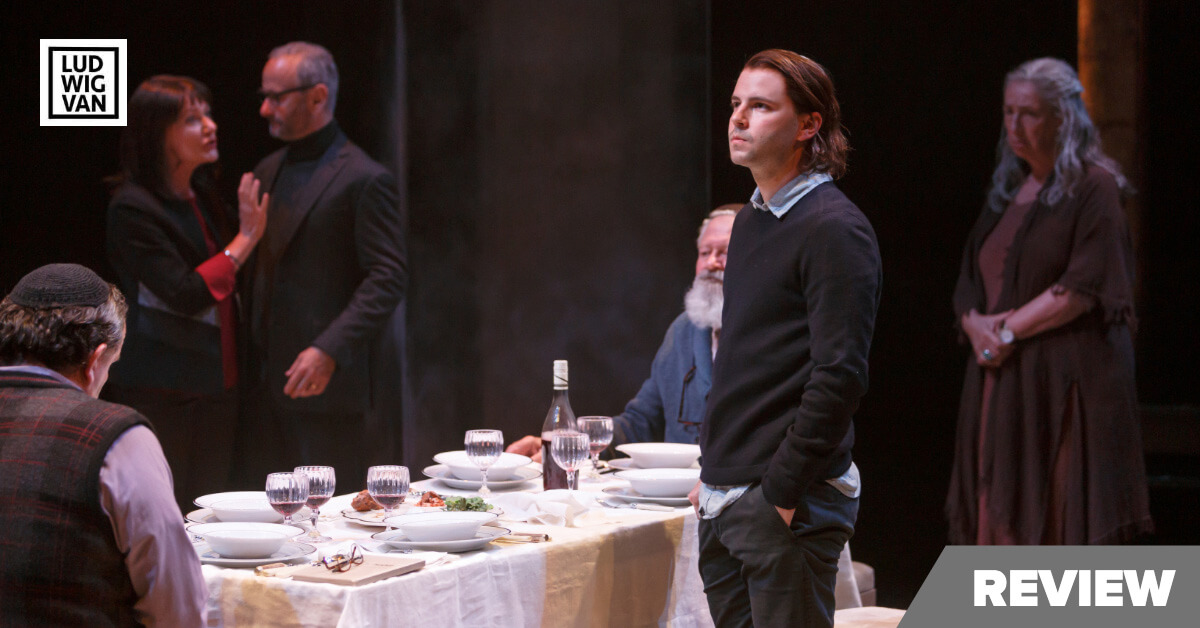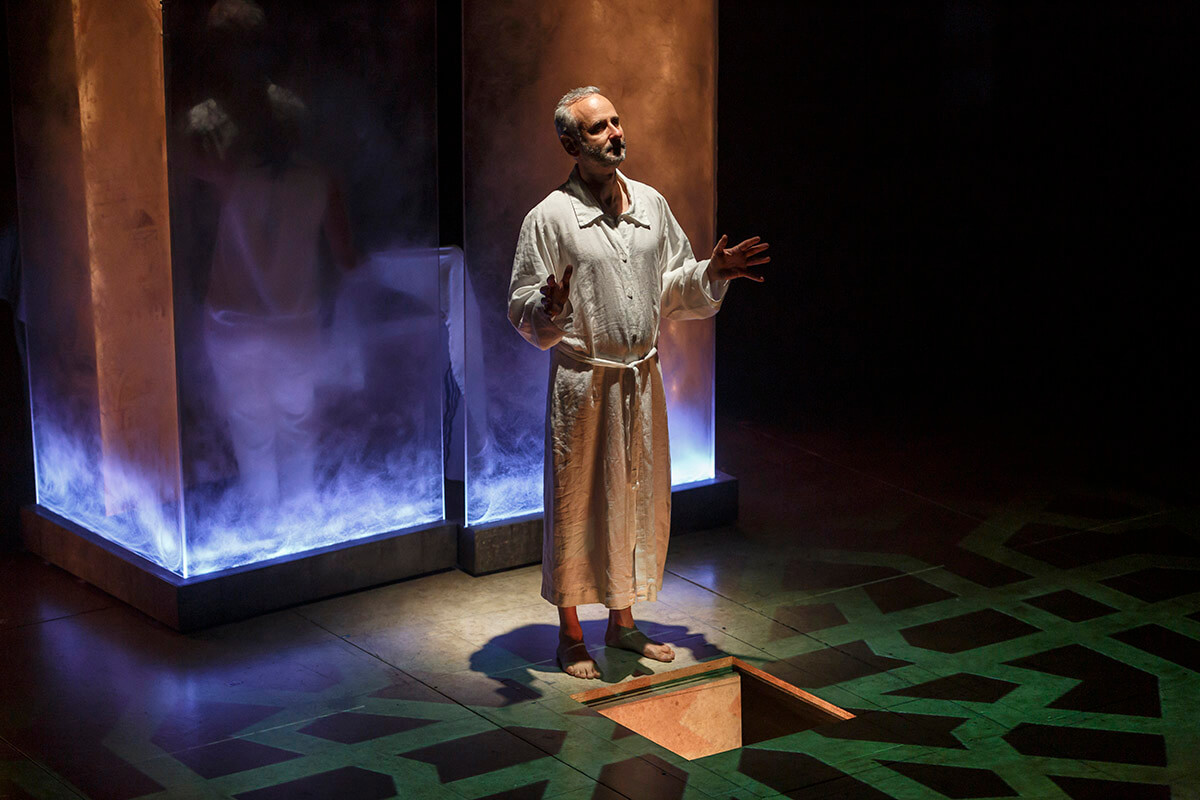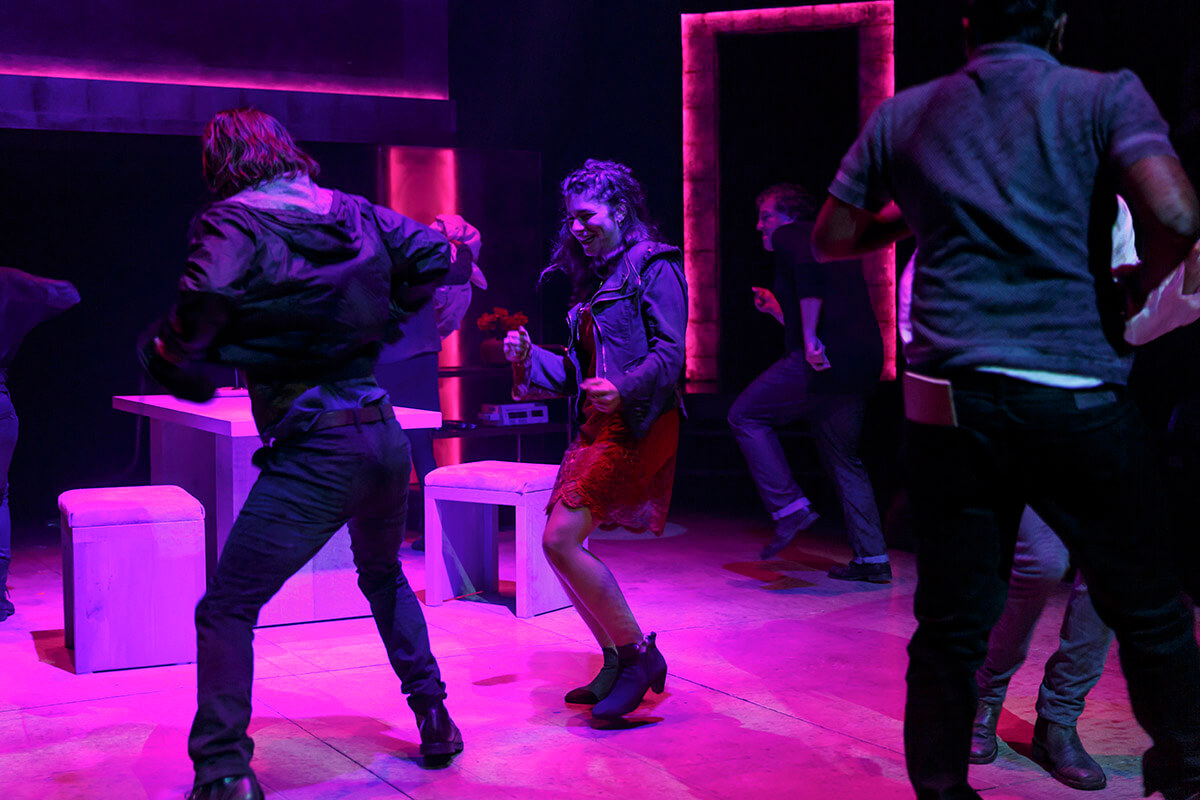
Stratford Festival 2019/Birds of a Kind by Wajdi Mouawad, translated by Linda Gaboriau, directed by Antoni Cimolino, Studio Theatre, Jul. 30 to Oct. 13. Tickets available at stratfordfestival.ca.
There is strong acting, and then there is acting with your guts hanging out. Such is the Stratford ensemble presenting Wajdi Mouawad’s Birds of a Kind (2017), which is receiving its English language premiere at the festival. Mouawad writes epic theatre. His plays are dense with themes and ideas, and fraught with personal turmoil for his characters. At over three hours in length, Birds of a Kind puts both the actors and the audience through an emotional ringer.
Mouawad was born in Lebanon, spent his youth in France, but became an author, actor and director in Quebec. His last gig before decamping to France where he now lives, was in the prestigious position as artistic director of Ottawa’s National Arts Centre French Theatre. His reputation as a man of theatre reaches international circles.
The genesis of Birds of a Kind is social historian Natalie Zemon Davis’ book Trickster Travels about the Moroccan diplomat al-Hasan ibn Muhammad al-Wazzan. He was captured by Christian pirates in 1518 on his way back from Mecca and given as a present to Pope Leo X. He changed his name to Leo Africanus when he converted to Christianity in exchange for his liberty at the behest of the pope. Leo Africanus’ erudite book on an introduction to Africa remained the standard text on the continent until European explorers made their own discoveries.
Al-Wazzan (Aladeen Tawfeek) figures in the play in two ways. He is the subject of Wahida’s (Baraka Rahmani) doctoral thesis and appears occasionally as a dream character. It is also a story he tells which gives the play its title and throughline. Wahida’s interest in al-Wazzan is how did he cope living between two cultures? Did he forgo his Islamic persona entirely or did he supress it? In short, Wahida is interested in the whole question of identity – and identity, and the myriad of questions and difficulties that surround it, is the crux of Mouawad’s play.
Birds of a Kind begins as a romance. New York-born Wahida of Moroccan descent, meets Berlin-born Eitan (Jakob Ehman), a geneticist of German/Jewish/Israeli descent in the library of Columbia University. Wahida has deliberately buried her Arab/Islamic roots, while Eitan believes only in the forty-six chromosomes that define every human being. Identity cannot be transmitted by blood, he says. As a result, these two grad students, who have no problem about their different backgrounds, are soon plunged into huge questions of identity when Eitan’s family, father David (Alon Nashman), mother Norah (Sarah Orenstein), and grandfather Etgar (Harry Nelken) visit him in New York to celebrate Passover. In a calamitous Seder dinner, David, in particular, rejects Eitan’s so-called Moslem girlfriend. A horrified Eitan literally takes samples of his family’s dinnerware to check their DNA, wondering if he really belongs to them biologically.

And so Mouawad begins to load in complications. Etgar, a holocaust survivor, went to Israel after the war, but left the country to accept a position in Berlin taking David with him, and leaving his estranged wife Leah (Deb Filler) behind. David is passionate on the subject of Jewish guilt that comes from surviving the Holocaust, and the belief that every Jewish person must carry this burden forward. Jews must produce Jewish children and so intermarriage is not an option. Norah, the daughter of avowed East German communists and atheists, did not find out about her Jewish background until she was fourteen. She married David, a religious Jew, against her father’s wishes. In a shocking turn of events, Eitan’s DNA tests prove that David and Norah are his parents, but that Etgar is not David’s father.
We are then plunged into the quagmire of the Israeli-Palestinian conflict. Based on the DNA results, Eitan and Wahida go to Israel to confront Leah, hoping to get answers, but Leah has not communicated with the family for thirty-five years. On the Allenby Bridge, a suicide bomb attack leaves Eitan near death in a coma. Wahida, who was being relentlessly questioned by the Israeli border guard Eden (Hannah Miller) was spared. Thus, the whole family is reunited in Israel and the family dynamics, with the inclusion of Leah, and the exclusion of Wahida, continues to unravel. For her part, Wahida is forced to confront her Arab/Moslem roots. She is not the most welcome visitor to Israel. Eventually, the secret of David’s birth comes to light but at a devastating cost to everyone.
While I’ve outlined the major plotlines in a linear fashion, Mouawad jumps between the past and present in his writing, with each time shift imparting new information. Not only that, at various times the cast speaks different languages, English, German, Hebrew, and Arabic, with English surtitles projected on various walls surrounding the thrust stage. (The language coaches are listed in the program, and the Tower of Babel construction of the play is truly an astonishing feat for the actors.) Mouawad has also divided the play into sections, with the titles projected on the walls – Birds of Beauty, Birds of Chance, Birds of Misfortune, Amphibious Birds — which both lead direct and confound. The sum total of all this for the characters is a morass of conflicting beliefs and prejudices, the weight of which threatens both a disintegration of a family and Eitan and Wahida’s romance. Throughout the play, the various characters speak in passionate discourse, pouring out their hearts, and emptying their souls. Mouawad’s torrent of words is not for the faint of heart. Birds of a Kind runs on full power from the very beginning, and the conflicts and confrontations never let up.

The acting is quite extraordinary among the major players because each character arc goes through changes like the constant swing of a pendulum. Mouawad’s writing requires a great deal from the actors in terms of an emotional rollercoaster. For example, Ehman’s Eitan begins with the full confidence of science as his standard bearer, only to be torn and twisted by his family’s treatment of Wahida and the secret of David’s birth. The same could be said for all the character portrayals. They begin with a baseline that morphs into a more disturbed personality. Wahida exhibits a quiet intelligence that cracks under the strain of uncertainty. David grows ever more hysterical in his passionate defence of Judaism. Norah, a psychiatrist who prides herself on reason, becomes irrationally torn between her husband and her son. The crusty, disengaged Leah is forced to face once again the reasons why her marriage failed so many years ago. Only Etgar as mediator keeps to his “everything is going to be alright” personality until he too has to confront the reality of the family secret. All the actors give performances worthy of the theatrical gods.
To mount this play of many scenes and locations, director Antoni Cimolino has opted for the cast to shift set pieces in a seamless flow. The transformations are very clever. For example, a table in the Columbia University library becomes a hospital bed for Eitan, and kudos to designer Francesca Callow for providing Cimolino with the wherewithal to pull off these transitions. Michael Walton has provided a dazzling light show where scene changes are covered by travelling beams that give a chaotic and frantic look to the stage. Levon Ichkhanian’s Middle-Eastern flavoured music carries with it the melancholy that the play imparts.
While one can applaud the tour-de-force nature of Birds of a Kind — it is, in fact, a mammoth undertaking — Mouawad’s creation is not perfect. The DNA tests are a weak plot device bordering on incredulity, soldier Eden’s lesbian advances to Wahida is gratuitous and her character drifts in limbo, while Wahida finding a home amid the Palestinians is an add-on. We are told about it, but we don’t see it happening. An important element such as this needs more build-up.
Nonetheless, no one can leave Birds of a Kind untouched. It is a powerful exploration of identity and the terrible burden it can place on people. Mouawad raises many uncomfortable questions that in this day and age, in particular, we are grappling with every day, be it personal identity, or our attitudes to immigration, or our view of world events. In Birds of a Kind, the audience is not innocent bystanders.
LUDWIG VAN TORONTO
Want more updates on classical music and opera news and reviews? Follow us on Facebook, Instagram or Twitter for all the latest.
- INTERVIEW | Actor Diego Matamoros Takes On Icon Walt Disney In Soulpepper Production Of Hnath Play - April 16, 2024
- SCRUTINY | Opera In Concert Shine A Light On Verdi’s Seldom Heard La Battaglia Di Legnano - April 9, 2024
- SCRUTINY | Lepage & Côté’s Hamlet Dazzles With Dance And Stagecraft Without Saying Anything New - April 5, 2024



